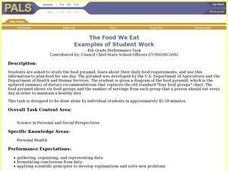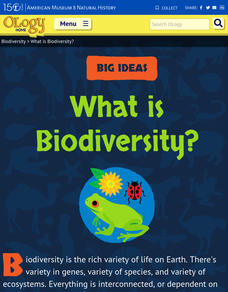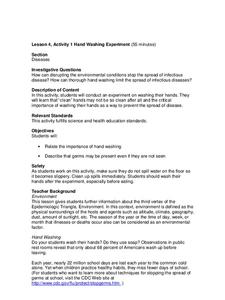University of Texas
What Are Calories?
What are calories, and how do calorie needs differ from person to person? Here is a worksheet that briefly explains how calories measure the energy supplied by food, as well as suggests the amount of food an individual should eat per day.
Judicial Learning Center
Law and the Rule of Law
We hear a lot about the importance of the rule of law, but most people do not really know what those words mean. The lesson is a webpage that defines the rule of law, explains why it is important in a democratic society and provides...
Curated OER
Importance of Fresh Vegetables and Fruits in Our Diets
Students explore the importance of fruits and vegetables in our diets. In this science lesson, students discuss various types of fruits and vegetables. Students play the good health=good diet game. Students discuss types of fruits and...
Curated OER
A Helthy Diet
Students examine their eating habits and experience analyzing data and drawing conclusions. They construct models of the molecular backbone of saturated and unsaturated fats. In addition, they examine the labels of their food, record...
Curated OER
Diseases
Sixth graders create a type of notebook or journal using colored copy paper on which to take notes. They complete research on a certain disease and report on it and then design their own disease causing bacteria or virus. Finally, 6th...
Curated OER
Introduction to Digestion: What Happens to a Hamburger?
Students explore the human body by analyzing how food is absorbed. In this food digestion lesson, students utilize health vocabulary terms by participating in a guessing game activity. Students discuss their own eating habits and conduct...
Curated OER
Food Pyramid-Planning a Healthy Meal
Students identify the five basic food groups. They use their knowledge of the food pyramid to plan a full meal that incorporates at least one serving of food from each group. Pupils classify their ingredients according to the food groups.
Curated OER
Digestion and Nutrition
Debunk the theory that a soda-and-candy diet is a nutritionally sound concept! Learners first read 2 paragraphs of background information covering essential nutrients, digestion, and homeostasis. Then, they use the information they...
Curated OER
Eat Your Sprouts Part I
Students will conduct a lab on the oxidation of an apple. The students will learn that the oxidation process can be halted when lemon juice is applied to the flesh of an apple because the lemon juice contains vitamin C, an antioxidant....
Curated OER
The Food We Eat
Young scholars plan a menu for one day after they study the food pyramid and learn about their daily food requirements. They are given an updated food pyramid with a summary fo dietary recommendations that replaces the old standard...
Curated OER
Health Lesson Plans
With childhood obesity becoming an epidemic, it's more important than ever for elementary students to learn healthy habits early on.
Curated OER
Explorit's Green Salad Quiz
In this food history instructional activity, students read the information about the history of food and salads. Students select the correct answer for the 6 related questions.
American Museum of Natural History
What is Biodiversity?
Not all dogs are the same just like not all finches are the same. An interactive online lesson helps individuals learn about the causes and limitations to biodiversity. The clickable sections describe the basics of the genetics of...
Curated OER
Keeping Your Heart in Good Shape: What are the Benefits? - Biology Teaching Thesis
Students name the main parts of the heart and what events occur there. They write a reaction that contains complete sentences, and uses proper spelling and grammar, after viewing a video. Students define the following terms: contraction,...
Curated OER
Digestion & Nutrition: a Case Study
Students explore digestion/nutrition and utilize scientific investigation skills. They complete meal logs for several days and graph their results. After analyzing their data, they write formal lab reports.
Centers for Disease Control and Prevention
Hand Washing Experiment
An engaging experiment allows scholars to understand why the recommendation is to wash for 20 seconds with soap and water — while making them aware of their own habits!
Curated OER
Tastes Great-- Is It Good for You?
Young scholars use the food guide pyramid established by the U.S. Department of Agriculture to evaluate the nutritional value of their favorite foods.
Curated OER
It's My Body
Students research the human body. In this human body lesson, students brainstorm the connections between the parts of a bike and a human digestive system. Students work in small groups and research a specific body system. Students then...
Curated OER
Science
Students read labels of candy bars. In this ingredients lesson plan, students examine a variety of candy bar labels to determine the contents. Students research to find additional information on each candy bar, then write an...
Curated OER
Windmills and Blogs: The Impact of Technology in Rural Peru
How does technology affect a community? Research the benefits and consequences of technology in rural Peru. In this technology lesson, learners discuss how the effects of technology. They view a PowerPoint and learn about the Peace...
Curated OER
Beef and Beef By-Products
Students examine the various types of beef and the many uses of its by-products. They increase their knowledge by playing a game of "beef bingo."They discuss what parts of beef animals are their by-products.
Curated OER
Home Sweet Home
Students explore marine turtle habitats. Students research one species of marine turtle found in the Gulf of Mexico. They identify plants and animals in the habitat. They create a model or replica using information gathered through their...
Curated OER
What's on Your Plate?
Students analyze the calorie content of food. In this health science lesson, students discuss how excess calories affect our body. They write a healthy meal plan for their family.
Curated OER
Health and Food Safety
Students discuss ways to keep healthy, and examine factors that influence health, including media. They then participate in mock public meeting on genetically modified foods in order to explore importance of governmental decisions in...























